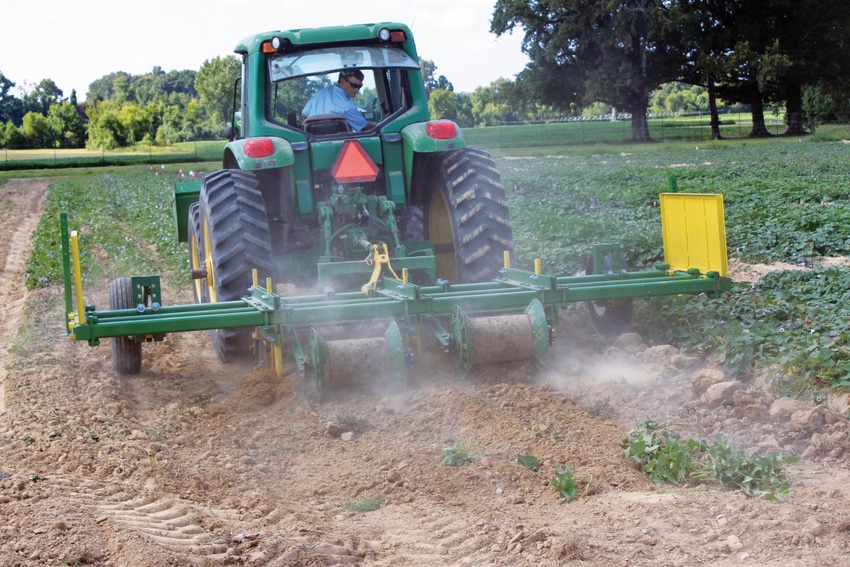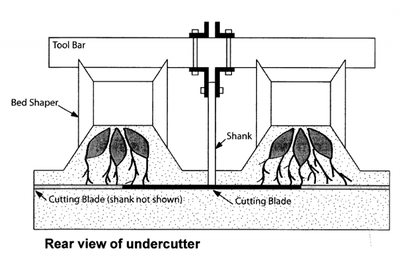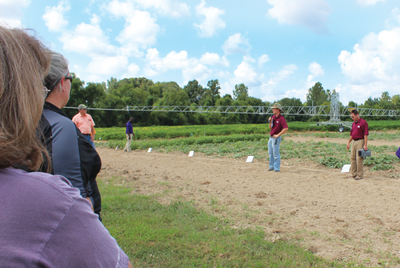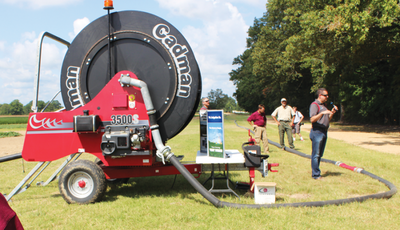
An implement under development by Mississippi State University engineers could make digging of sweet potatoes more efficient, with an important corollary benefit of improving skin strength of the product prior to harvest.

JASON WARD
“Better skin strength can be an advantage for both traditional and bulk harvesting producers,” says Jason Ward, assistant Extension professor of agricultural and biological engineering at MSU, who discussed the sweet potato undercutter, or razor plow, at a field day held at the Pontotoc Ridge/Flatwoods Experiment Station at Algoma, Miss.
“Skinning at harvest can be a major problem. If we can toughen the skin of the sweet potatoes before harvest, it should help to improve storage life and reduce some of the losses related to storage.”
Better sweet potatoes goal of Mississippi research
The mechanical devining method now widely used can cause stress and risk of infection while potatoes are waiting to be harvested.
Initial results with the popular Beauregard variety, Ward says, have shown that undercutting with vines on resulted in greater skin strength than devining at six days after treatment.
“This is still a prototype — this our second year of work with it — but based on what we’ve seen, we believe this undercutter can be another useful tool to add flexibility to the overall sweet potato production system.”
The implement was built “entirely of off-the-shelf components,” Ward says.
Ag news delivered daily to your inbox: Subscribe to Delta Farm Press Daily.

THIS SCHEMATIC shows how the undercutter implement loosens sweet potatoes in the soil and lifts them for harvesting.
Working with Ward on the undercutter are Jeremiah Davis, associate professor; Wes Lowe, research associate; Bradley Hayes, graduate research assistant, all in the MSU Department of Agricultural and Biological Engineering; and Mark Shankle, research professor, and Ramon Arancibia, assistant research professor, at the Pontotoc Ridge/Flatwoods Experiment Station.
Studies on the station are also evaluating the impact of irrigation on sweet potato production. These include overhead sprinkler watering with a traveler boom/hose reel system and irrigation with drip tape.
The Briggs Boom irrigation rig is linked with a Cadman 3500 Traveler hose system that pumps water from a nearby lagoon.
“This system provides uniform coverage, with very efficient use of water,” says Billy Black, High Tech Equipment Sales. “It offers the efficiency of a pivot with the portability of a reel system. The boom folds so it can easily be moved from field to field.

A BRIGGS traveling boom irrigation system is being used to water sweet potato plots at the Pontotoc Ridge/Flatwoods Experiment Station.
“Mississippi State University research has shown irrigation can increase sweet potato yields as much as 20 percent. In drought conditions, a system can pay for itself in as little as two years.
“If you can help Mother Nature by providing water when it’s needed, you can put more money in your pocket,” Black says.
Ramon Arancibia, assistant research professor at the station, says drip irrigation is being evaluated to determine if it can be an effective system for sweet potato growers.

THE CADMAN traveler hose system provides water for the boom irrigation rig. Water is pumped from a lagoon to water sweet potatoes.
“We’re looking at wide beds with drip tape in between,” he says. “We’re also finding that tall beds help to increase drainage and reduce risk of water-induced rots and spoilages in periods of heavy rainfall.”
In other sweet potato research, Beth Stokes, MSU plant pathologist, discussed a multi-state, multi-year project on the occurrence of the end/tip rot complex.
“We’re in data analysis now, and we hope to be able to provide growers with tools that will enable them to know more about the organisms in their fields and to better manage these diseases,” she says.
Jeff Main, research associate at the station, outlined work being done in variety trials at Pontotoc and Crystal Springs stations, as well as on-farm.
“There are a number of varieties that have performed well, with very good yields and quality,” he says. “Mississippi growers now have a lot of variety choices, which gives them good options beyond the Beauregard standard.
“We hope growers will take a careful look at some of these varieties and give them a chance in future plantings.”
Oppressive immigration laws hurting Mississippi sweet potato industry?
A number of trials and projects on weed and insect control are under way at the Pontotoc station, the Delta Research and Extension Center, and elsewhere in the state.
Issah Abukari, Ph.D. graduate student in plant and soil sciences, outlined his work with Dual Magnum and storage root initiation.
“We wanted to determine the rate at which root injury occurs from different application timing,” he says.
Other herbicides used in various combinations and rates for weed control include Brake, Fierce, Valor, Command, Lasso, Post, and Sandea.
Nutsedges — purple, yellow, rice flatsedge, and annual sedge — are among the weeds posing problems for growers, according to Mark Shankle, research professor at the station.
“With all the rain we had this spring, yellow nutsedge has been a big issue.”
Larry Adams, USDA Agricultural Research Service entomologist at Stoneville, Miss., discussed research being done on control of sugarcane beetles.
“This is a sporadic pest in Mississippi,” he says, “but in Louisiana, you can lose entire fields.”
Studies are also looking at the correlation between wireworm damage and the incidence of sugarcane beetles.
About the Author(s)
You May Also Like




